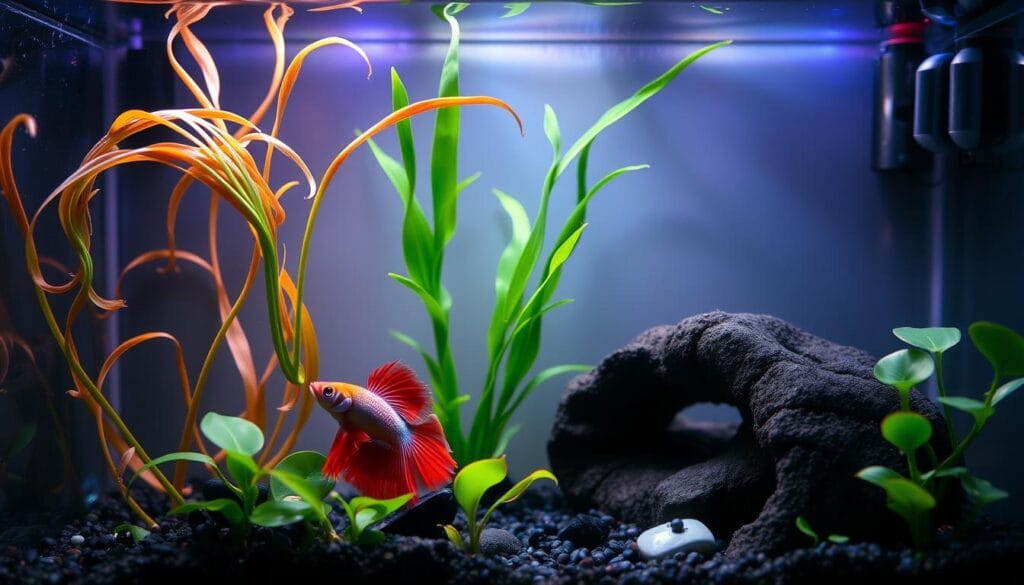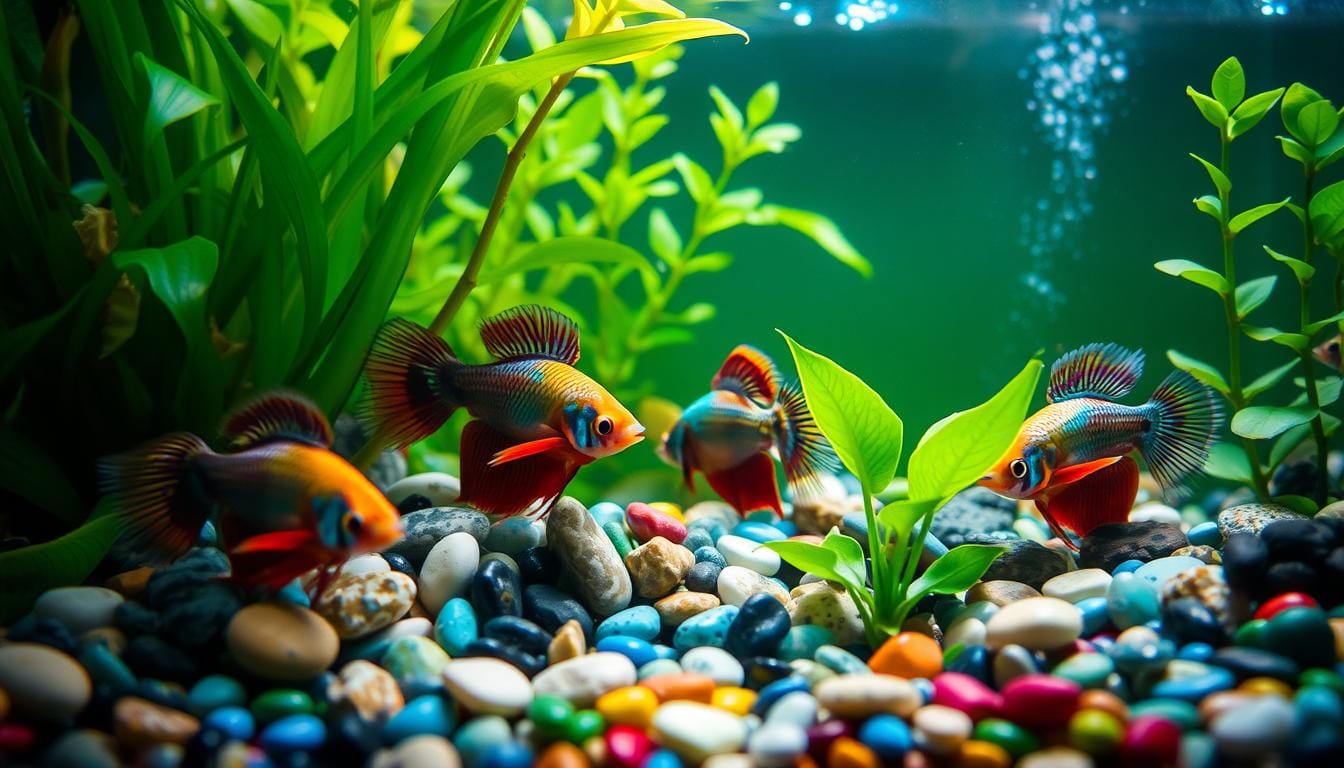Ever wondered about your betta fish’s sleep world? Many aquarium fans are surprised by their unique sleeping habits. These colorful creatures sleep differently than we do.
Betta fish sleep, but not like humans. They don’t have eyelids, so their sleep is quite different. Your betta will take many short naps, resting for 8 to 12 hours a day.
Learning about betta fish sleep helps you make their home better. These active animals sleep best when it’s dark. This makes them great for a bedroom aquarium.
Table of Contents
Understanding Betta Fish Sleep Patterns
Betta fish have interesting sleep behaviors that are different from many other fish. Their sleep patterns show a complex world of rest and activity. Every aquarium lover should know about this.
Exploring betta fish nocturnal behavior reveals how they manage their rest. These fish are active during the day and sleep at night, like humans.
Why Sleep is Important for Bettas
Sleep is vital for a betta fish’s health and happiness. Here’s why:
- Energy replenishment
- Organ processing of food and waste
- Maintaining immune system function
- Supporting mental and physical recovery
Signs Your Betta is Sleeping
Knowing when your betta is resting helps you understand their sleep patterns. Look for these signs:
| Sleep Behavior | Description |
|---|---|
| Stillness | Minimal movement in the tank |
| Color Change | Slightly less vibrant coloration |
| Breathing | Slower mouth and gill movement |
Interestingly, bettas can sleep in various positions – curled up, lying on their side, or even vertically. They usually sleep in short 20-minute bursts at night, showing they are light sleepers.
Bettas need about 12-16 hours of darkness to keep a healthy sleep cycle and support their natural rhythms.
Understanding how betta fish rest requires patience and careful watching. Each betta has its own sleep preferences, making their rest patterns as unique as their personalities.
The Science Behind Fish Sleep
Diving into the world of fish sleep shows a unique biological phenomenon. It’s very different from how mammals sleep. Fish have developed special sleep strategies that challenge our understanding of rest.
The betta fish sleep cycle is a remarkable example of aquatic rest. Unlike mammals, these creatures sleep without closing their eyes. They don’t have eyelids. This makes their sleep science very interesting to researchers.
How Fish Sleep Differs from Mammals
Fish sleep patterns are very different from mammal rest. Key differences include:
- No eyelid closure during sleep
- Continuous low-energy movement during rest
- Different brain activity compared to mammals
- No true REM sleep stages
*”Fish rest without traditional sleep mechanisms, showcasing nature’s incredible adaptability.”*
The Role of Circadian Rhythms in Bettas
Circadian rhythms in bettas are key to their sleep-wake cycles. These internal clocks are influenced by light and darkness. They guide their rest patterns.
| Sleep Characteristic | Betta Fish Details |
|---|---|
| Average Nightly Sleep | 7-8 hours |
| Daily Nap Frequency | Multiple short naps |
| Preferred Sleeping Locations | Among leaves, tank structures |
Understanding these sleep mechanisms helps aquarium fans create the best environments for betta fish. It ensures they get healthy rest and are active when awake.
Environment’s Impact on Betta Fish Sleep
Your betta fish’s sleep quality depends on a good sleep environment. Knowing how to set up the tank can greatly improve their rest and health.
To create the best sleep environment for your betta fish, focus on several important factors. These elements help make a comfortable and peaceful home for your fish.
Lighting and Sleep Cycles
Betta fish need regular light cycles to sleep well. Make sure to provide:
- 8-12 hours of soft, indirect light during the day
- 12-16 hours of complete darkness at night
- An aquarium timer for steady lighting
“Consistent lighting is the key to a healthy sleep routine for betta fish.”
Creating a Comfortable Habitat
Design your betta fish’s sleep area with various resting spots. Think about these points:
- Put in floating plants for surface-level rest
- Add caves or tunnels at different levels
- Use a betta hammock for extra comfort
- Keep the water temperature between 76-82°F
Your betta needs a quiet, dark place to sleep safely. Don’t put the tank in busy areas or places with too much light and noise.
Common Misconceptions About Betta Fish Sleep
Betta fish sleeping myths can confuse new aquarium owners. Knowing the truth about betta fish rest facts helps you care for them better.
Many people think betta fish don’t sleep because their eyes stay open. This is a common mistake about these unique pets.
Do Bettas Really Rest?
Betta fish do sleep, but their sleep looks different from mammals. They have unique sleeping behaviors that might seem strange to new owners:
- Bettas usually rest at night, following a day-night pattern
- They often sleep near the tank’s bottom or between plants
- Their open eyes can make sleeping seem less obvious
Myths vs. Facts
“Not all floating bettas are sleeping — some might be experiencing health issues.”
Let’s debunk some key betta fish sleeping myths:
- Myth: Bettas don’t need darkness to sleep
Fact: They need 12 hours of darkness for good rest
- Myth: Floating means sleeping
Fact: Floating could mean stress or illness
- Myth: Bettas sleep with closed eyes
Fact: They sleep with open eyes because they lack eyelids
Understanding these betta fish rest facts helps you create a better environment for their health and well-being.
How to Recognize Your Betta Fish’s Sleep Behavior
It’s important to know how your betta fish sleeps to keep them healthy. Betta fish sleep in ways that might surprise you. Knowing these patterns helps you create a better home for them.
Betta fish sleep differently than mammals. They don’t have eyelids, making it interesting and sometimes hard to see when they’re sleeping.
Observing Behavior Changes
Here are some signs your betta fish is sleeping:
- They move less and stay still
- They float in place or rest on decorations
- Their gills move slower
- Their colors might look a bit duller
Ideal Sleeping Positions
Betta fish sleep in unique ways that might seem strange:
- Vertical Sleeping: Some bettas sleep with their head down
- Side Sleeping: They rest on their side near plants or decorations
- Bottom Rest: They lay on the substrate or flat surfaces
“Bettas need a dark, quiet place to rest well,” says marine biologist Dr. Emily Roberts.
| Sleep Position | Typical Location | Duration |
|---|---|---|
| Vertical | Near tank decorations | 6-8 hours |
| Side Sleeping | On plant leaves | 4-6 hours |
| Bottom Rest | Tank substrate | 2-4 hours |
Keep a regular light cycle and don’t wake your betta during their sleep. This helps them stay healthy and happy.
Tips for Enhancing Your Betta’s Sleep
Creating a good bedtime routine for your betta fish is key to their health. Knowing how to help them sleep better can greatly improve their life.

Your betta’s sleep space is very important for their rest. They need certain conditions to sleep well.
Creating a Calm Nighttime Habitat
To make a perfect sleep spot for your betta, follow these tips:
- Use a timer for aquarium lights to keep a steady light cycle
- Place the tank in a quiet spot, away from busy areas
- Give them places to hide, like dense plants and ceramic caves
- Keep the water temperature between 76-80 degrees Fahrenheit
Minimizing Sleep Disruptions
To help your betta sleep better, avoid these things:
- Don’t make sudden moves near the tank at night
- Keep the area around the tank quiet
- Use a soft night light for gentle light
- Make sure the water quality stays the same
A peaceful place is essential for your betta’s sleep and health.
Sleep-Friendly Tank Setup
| Sleep Requirement | Recommended Setting |
|---|---|
| Daily Sleep Duration | 12-14 hours |
| Nighttime Rest | 6-8 hours |
| Ideal Water pH | 6.5-7.5 |
| Tank Size | Minimum 5 gallons |
Remember, a well-rested betta is a happy and healthy betta!
Betta Fish Sleep and Health
It’s key to know how sleep affects your betta fish’s health. Good sleep helps keep them physically and mentally strong.
Effects of Sleep Deprivation in Bettas
Sleeping too little can harm your betta fish. Not getting enough rest weakens their immune system. This makes them more likely to get sick and stressed.
- Compromised immune response
- Increased vulnerability to infections
- Reduced overall energy levels
- Potential behavioral changes
Monitoring Sleep Patterns for Optimal Health
Watching how much your betta fish sleeps is important. They usually need 4-8 hours of rest per day. If they sleep too much or too little, it could mean they’re not healthy.
| Sleep Indicator | Healthy Range | Potential Concern |
|---|---|---|
| Daily Rest Duration | 4-8 hours | Excessive sleeping or restlessness |
| Water Temperature | 78-82°F | Temperature fluctuations |
| Resting Position | Stationary, relaxed | Erratic or unusual positioning |
Good food and tank conditions help your betta sleep well. Keep the water clean, the temperature right, and the tank calm. This helps your betta rest and stay healthy.
“A well-rested betta is a healthy betta” – Aquarium Experts
When to Be Concerned About Your Betta’s Sleep
It’s important to watch how your betta fish sleeps to keep it healthy. Small changes in sleep can mean big health problems. Spotting these signs early can help keep your betta happy and well.

Knowing what’s normal and what’s not in your betta’s sleep is key. Exotic Pet Haven suggests watching your betta closely to catch health issues early.
Signs of Distress or Illness
Look out for these signs that might mean your betta is having sleep problems:
- Prolonged daytime sleeping
- Difficulty maintaining buoyancy
- Unusual color changes during rest
- Irregular gill movement while sleeping
- Complete lack of movement for extended periods
When to Consult a Veterinarian
Some symptoms need vet help right away. Get a vet if you see:
- Persistent changes in sleep patterns
- Loss of appetite
- Significant color fading
- Labored breathing during rest
“Early intervention can be the key to preventing serious health complications in betta fish.” – Aquatic Health Experts
Studies show 27% of betta fish change color while sleeping, which might mean health issues. Watching for these small changes can help catch problems early.
| Sleep Concern | Action Required |
|---|---|
| Excessive Daytime Sleeping | Check water quality and temperature |
| Irregular Breathing | Consult aquatic veterinarian |
| Color Changes | Evaluate diet and environment |
Your betta’s sleep is a clue to its health. Stay alert, keep its environment stable, and get vet advice if something seems off.
Conclusion: Caring for Your Betta’s Well-Being
Betta fish care needs dedication and knowing their special needs. By creating the best environment, you can greatly improve your pet’s health and life span. With the right care, betta fish can live up to 5 years or more.
Keeping a stable home for your betta is key. This means keeping the water at 76°F to 82°F, changing 20-30% of the water weekly, and using a 5-gallon tank. Also, watch the water’s pH, ammonia, and nitrate levels to avoid health problems.
Final Tips for Optimal Sleep
Help your betta sleep well by setting a light cycle of 8-12 hours and keeping the tank quiet. Watch for signs of aging like less energy and color changes. Understanding your betta’s sleep needs helps keep it healthy and happy.
Emphasizing a Healthy Environment
Every betta is different, so watch and adjust to what your fish needs. Feed a balanced diet, don’t overcrowd, and pick good tank mates like Mystery snails or Cory catfish. With careful care, your betta will live a happy and peaceful life in its home.

